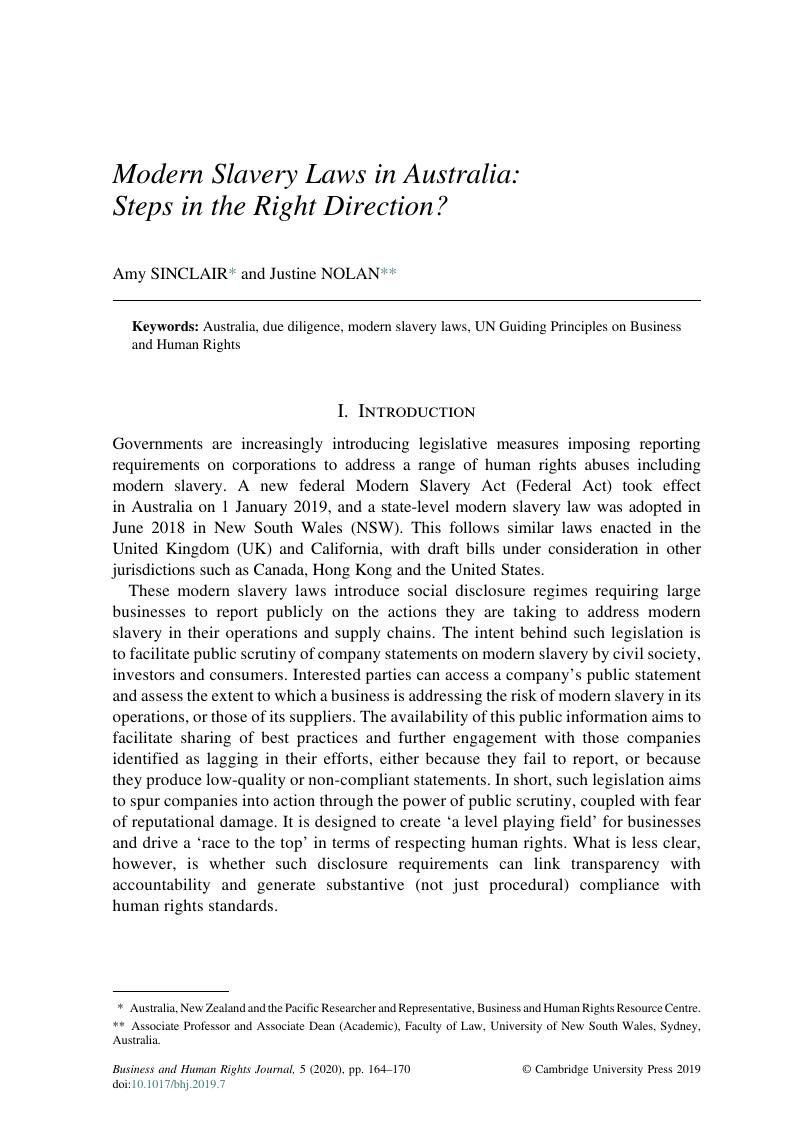Article contents
Modern Slavery Laws in Australia: Steps in the Right Direction?
Published online by Cambridge University Press: 20 June 2019
Abstract

Keywords
- Type
- Developments in the Field
- Information
- Copyright
- © Cambridge University Press 2019
References
1 Parliament of the Commonwealth of Australia, ‘Hidden in Plain Sight’ (December 2017), https://parlinfo.aph.gov.au/parlInfo/download/committees/reportjnt/024102/toc_pdf/HiddeninPlainSight.pdf (accessed 23 March 2019).
2 The Senate Legal and Constitutional Affairs Legislation Committee, ‘Report Modern Slavery Bill 2018 [Provisions]’ (24 August 2018), https://www.aph.gov.au/Parliamentary_Business/Committees/Senate/Legal_and_Constitutional_Affairs/ModernSlavery/Report (accessed 23 March 2019).
3 Comments by Mr Chris Crewther MP made at Global Compact Network Australia’s Modern Slavery Forum held in Sydney on 6 April 2017.
4 Amy Sinclair and Felicitas Weber, ‘Australia Must Legislate to Prevent Modern Slavery in our Supply Chains, The Guardian (11 April 2017), https://www.theguardian.com/sustainable-business/2017/apr/11/australia-must-legislate-to-prevent-modern-slavery-in-our-supply-chains (accessed 23 March 2019).
5 Whilst injunctive relief is available under the UK Act, this avenue of recourse remains untested.
6 The method of publication and prescribed reporting content will be detailed in accompanying statutory regulations, which will also likely take effect on 1 July 2019.
7 The NSW Act establishes a corresponding law approach with the Federal Act. If an entity is subject to both, then the NSW reporting requirement does not apply.
8 As at 23 March 2019, the Modern Slavery Registry contains 8,469 statements of the estimated 12,000–17,000 required statements. IASC, University of Nottingham Rights Lab, ‘Agriculture and Modern Slavery Act Reporting: Poor Performance Despite High Risks’ (2018), http://www.antislaverycommissioner.co.uk/media/1220/modern-slavery-act-and-agriculture-poor-performance-briefing.pdf (accessed 23 March 2019).
9 Business and Human Rights Resource Centre, ‘First Year of FTSE 100 Reports Under the UK Modern Slavery Act: Towards Elimination?’ (2017), https://www.business-humanrights.org/sites/default/files/FTSE%20100%20Report%20FINAL%20%28002%291Dec2017.pdf (accessed 23 March 2019).
10 See Surya Deva, ‘Slavery and Gender-Blind Regulatory Responses’, BHRJ Blog, http://blog.journals.cambridge.org/2019/03/08/slavery-and-gender-blind-regulatory-responses/ (accessed 23 March 2019).
11 See Melanie Barber et al v Nestle USA, Inc., No. 16-55041 9th Cir. (2018); Monica Sud v Costco Wholesale Corporation et al, No. 4 15-cv-03783; and Tomasella v The Hershey Company No. 1 18-cv-10360 (2018).
12 Human Rights Council, ‘Guiding Principles on Business and Human Rights: Implementing the United Nations “Protect, Respect and Remedy” Framework’, Report of the Special Representative of the Secretary-General on the issue of Human Rights and Transnational Corporations and Other Business Enterprises, A/HRC/17/31 (21 March 2011), Principles 17-20.
13 Ethical Trading Initiative and Hult International Business School, ‘Corporate Leadership on Modern Slavery: How Have Companies Responded to the Modern Slavery Act One Year On?’, https://www.ethicaltrade.org/sites/default/files/shared_resources/corporate_leadership_on_modern_slavery_full_report_2016.pdf (accessed 21 August 2018).
14 The open-ended intergovernmental working group on transnational corporations and other business enterprises with respect to human rights is currently negotiating a binding instrument. The zero draft of the proposed instrument was released in July 2018: https://www.ohchr.org/Documents/HRBodies/HRCouncil/WGTransCorp/Session3/DraftLBI.pdf (accessed 23 March 2019).
15 Krawiec, KD, ‘Cosmetic Compliance and the Failure of Negotiated Governance’ (2003) 81 Washington University Law Quarterly 487.Google Scholar
- 11
- Cited by


